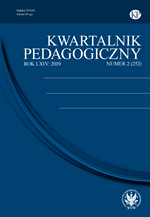Education as edification: Richard Rorty’s neo-pragmatist philosophy of education
Education as edification: Richard Rorty’s neo-pragmatist philosophy of education
Author(s): Mirosław WoźnicaSubject(s): Philosophy, Social Sciences, Education, Social Philosophy, Communication studies
Published by: Wydawnictwa Uniwersytetu Warszawskiego
Keywords: Rorty; edification; philosophy of education; ironist; neo-pragmatism; communication; hermeneutics
Summary/Abstract: Rorty draws from pragmatism, conversation, edification, and hermeneutics, but in spite of hisreference to Dewey’s thesis on pragmatism, Rorty’s notion of ‘pragmatism’ is not offered asan idea of something that might fill the gaps left by slowly dying traditional philosophy. It israther a more relaxed attitude of mind. He goes beyond the traditional notion of pragmatismand insists that the search should not focus on truth but on solidarity, in other words, whatwe as a group of people create and decide what is true. Truth, for Rorty, is a society’s exerciseand agreement of what is true. It is achieved by discourse and not limited conversations.In order to educate a person as an individual who lives in a particular society with allthe factors contributing to his/her growth, Rorty adopts a new word for education, namelyedification, with its philosophical consequences. He draws on the work of Hans-Georg Gadamerto explore the idea of ‘edification,’ a word Rorty uses to gloss Gadamer’s Bildung (education,self-formation) (Rorty 1979).
Journal: Kwartalnik Pedagogiczny
- Issue Year: 252/2019
- Issue No: 2
- Page Range: 242-253
- Page Count: 12
- Language: English
- Content File-PDF

